Reflection on Learning: Stolen Generation - Sociology Module 2
VerifiedAdded on 2022/09/13
|6
|1264
|11
Journal and Reflective Writing
AI Summary
This assignment is a reflective journal entry by a student examining the Stolen Generation, focusing on the assimilation policies and their impact on Aboriginal and Torres Strait Islander peoples. The student utilizes the Gibbs Reflective Model to analyze their initial feelings, acquired knowledge, and evolving perspectives on the historical context of forced removals and cultural loss. The reflection delves into the political, cultural, and environmental factors influencing the student's understanding, addressing stereotypes and biases. The student concludes with a revised understanding of the issues, acknowledging the intergenerational trauma, and outlining an action plan for future practice as a healthcare professional, emphasizing the need for open-mindedness and cultural sensitivity when providing care. The assignment references key literature on the Stolen Generation, including works by Menzies, Murphy, and Smith & Gilchrist.
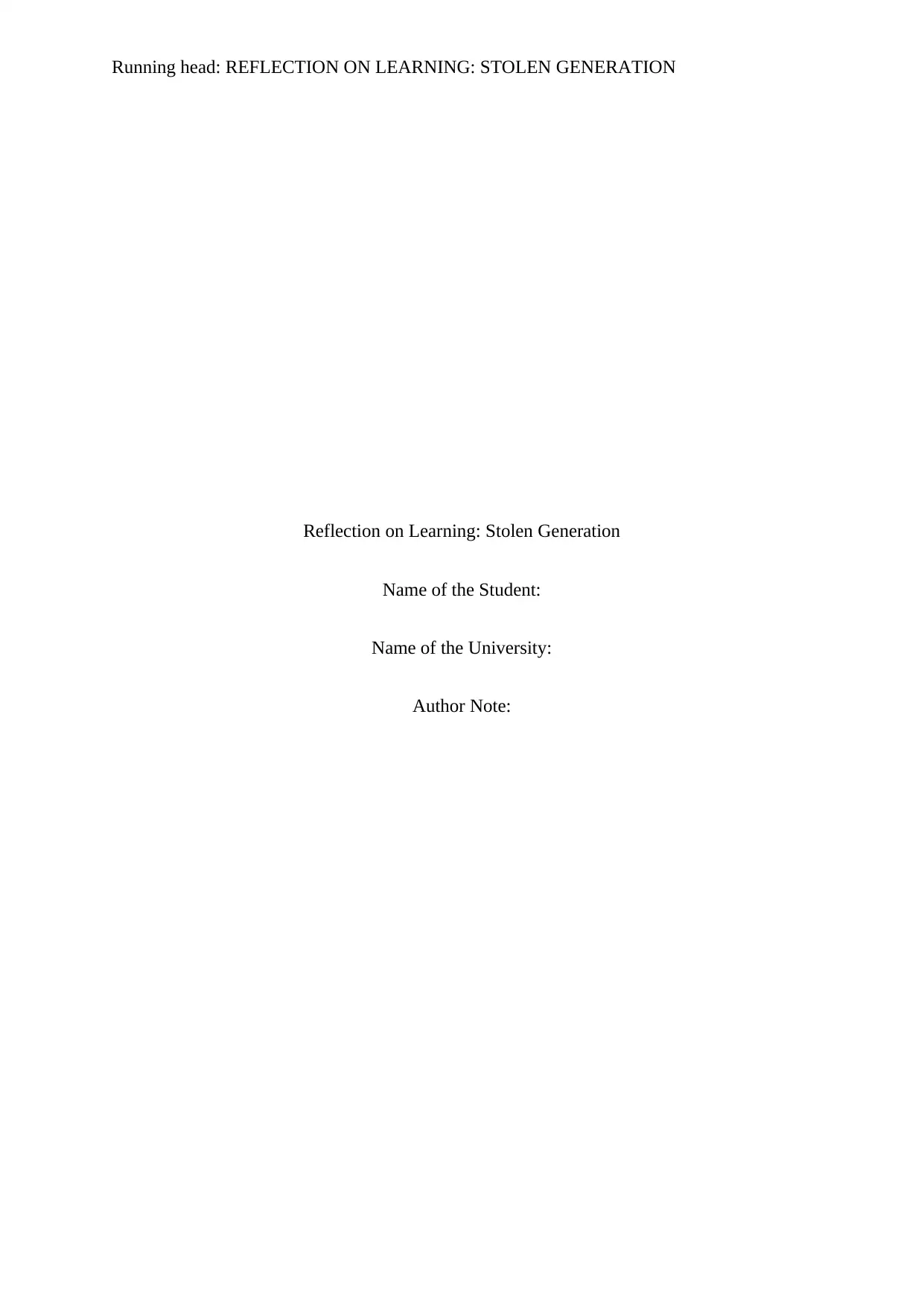
Running head: REFLECTION ON LEARNING: STOLEN GENERATION
Reflection on Learning: Stolen Generation
Name of the Student:
Name of the University:
Author Note:
Reflection on Learning: Stolen Generation
Name of the Student:
Name of the University:
Author Note:
Paraphrase This Document
Need a fresh take? Get an instant paraphrase of this document with our AI Paraphraser
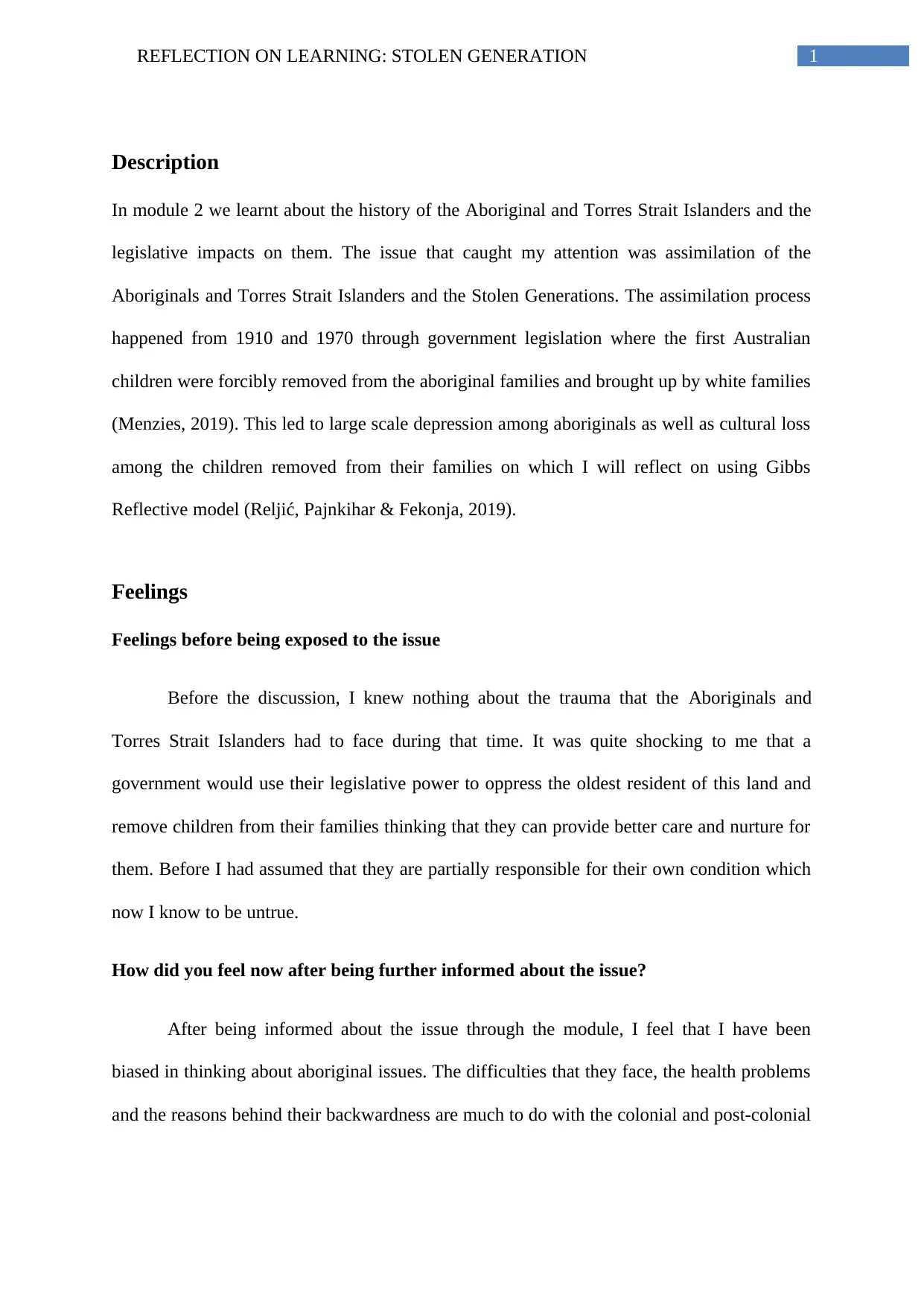
1REFLECTION ON LEARNING: STOLEN GENERATION
Description
In module 2 we learnt about the history of the Aboriginal and Torres Strait Islanders and the
legislative impacts on them. The issue that caught my attention was assimilation of the
Aboriginals and Torres Strait Islanders and the Stolen Generations. The assimilation process
happened from 1910 and 1970 through government legislation where the first Australian
children were forcibly removed from the aboriginal families and brought up by white families
(Menzies, 2019). This led to large scale depression among aboriginals as well as cultural loss
among the children removed from their families on which I will reflect on using Gibbs
Reflective model (Reljić, Pajnkihar & Fekonja, 2019).
Feelings
Feelings before being exposed to the issue
Before the discussion, I knew nothing about the trauma that the Aboriginals and
Torres Strait Islanders had to face during that time. It was quite shocking to me that a
government would use their legislative power to oppress the oldest resident of this land and
remove children from their families thinking that they can provide better care and nurture for
them. Before I had assumed that they are partially responsible for their own condition which
now I know to be untrue.
How did you feel now after being further informed about the issue?
After being informed about the issue through the module, I feel that I have been
biased in thinking about aboriginal issues. The difficulties that they face, the health problems
and the reasons behind their backwardness are much to do with the colonial and post-colonial
Description
In module 2 we learnt about the history of the Aboriginal and Torres Strait Islanders and the
legislative impacts on them. The issue that caught my attention was assimilation of the
Aboriginals and Torres Strait Islanders and the Stolen Generations. The assimilation process
happened from 1910 and 1970 through government legislation where the first Australian
children were forcibly removed from the aboriginal families and brought up by white families
(Menzies, 2019). This led to large scale depression among aboriginals as well as cultural loss
among the children removed from their families on which I will reflect on using Gibbs
Reflective model (Reljić, Pajnkihar & Fekonja, 2019).
Feelings
Feelings before being exposed to the issue
Before the discussion, I knew nothing about the trauma that the Aboriginals and
Torres Strait Islanders had to face during that time. It was quite shocking to me that a
government would use their legislative power to oppress the oldest resident of this land and
remove children from their families thinking that they can provide better care and nurture for
them. Before I had assumed that they are partially responsible for their own condition which
now I know to be untrue.
How did you feel now after being further informed about the issue?
After being informed about the issue through the module, I feel that I have been
biased in thinking about aboriginal issues. The difficulties that they face, the health problems
and the reasons behind their backwardness are much to do with the colonial and post-colonial
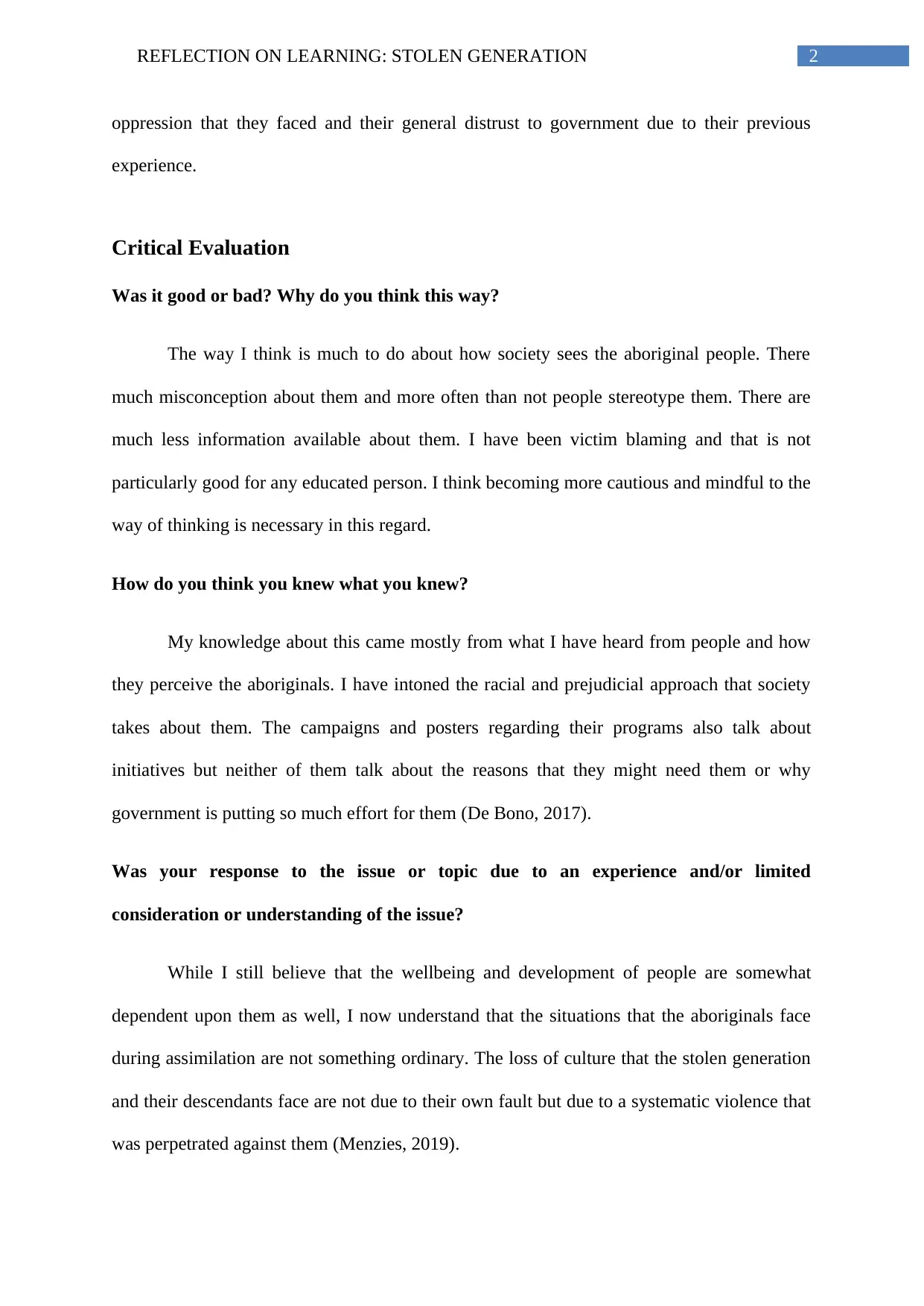
2REFLECTION ON LEARNING: STOLEN GENERATION
oppression that they faced and their general distrust to government due to their previous
experience.
Critical Evaluation
Was it good or bad? Why do you think this way?
The way I think is much to do about how society sees the aboriginal people. There
much misconception about them and more often than not people stereotype them. There are
much less information available about them. I have been victim blaming and that is not
particularly good for any educated person. I think becoming more cautious and mindful to the
way of thinking is necessary in this regard.
How do you think you knew what you knew?
My knowledge about this came mostly from what I have heard from people and how
they perceive the aboriginals. I have intoned the racial and prejudicial approach that society
takes about them. The campaigns and posters regarding their programs also talk about
initiatives but neither of them talk about the reasons that they might need them or why
government is putting so much effort for them (De Bono, 2017).
Was your response to the issue or topic due to an experience and/or limited
consideration or understanding of the issue?
While I still believe that the wellbeing and development of people are somewhat
dependent upon them as well, I now understand that the situations that the aboriginals face
during assimilation are not something ordinary. The loss of culture that the stolen generation
and their descendants face are not due to their own fault but due to a systematic violence that
was perpetrated against them (Menzies, 2019).
oppression that they faced and their general distrust to government due to their previous
experience.
Critical Evaluation
Was it good or bad? Why do you think this way?
The way I think is much to do about how society sees the aboriginal people. There
much misconception about them and more often than not people stereotype them. There are
much less information available about them. I have been victim blaming and that is not
particularly good for any educated person. I think becoming more cautious and mindful to the
way of thinking is necessary in this regard.
How do you think you knew what you knew?
My knowledge about this came mostly from what I have heard from people and how
they perceive the aboriginals. I have intoned the racial and prejudicial approach that society
takes about them. The campaigns and posters regarding their programs also talk about
initiatives but neither of them talk about the reasons that they might need them or why
government is putting so much effort for them (De Bono, 2017).
Was your response to the issue or topic due to an experience and/or limited
consideration or understanding of the issue?
While I still believe that the wellbeing and development of people are somewhat
dependent upon them as well, I now understand that the situations that the aboriginals face
during assimilation are not something ordinary. The loss of culture that the stolen generation
and their descendants face are not due to their own fault but due to a systematic violence that
was perpetrated against them (Menzies, 2019).
⊘ This is a preview!⊘
Do you want full access?
Subscribe today to unlock all pages.

Trusted by 1+ million students worldwide
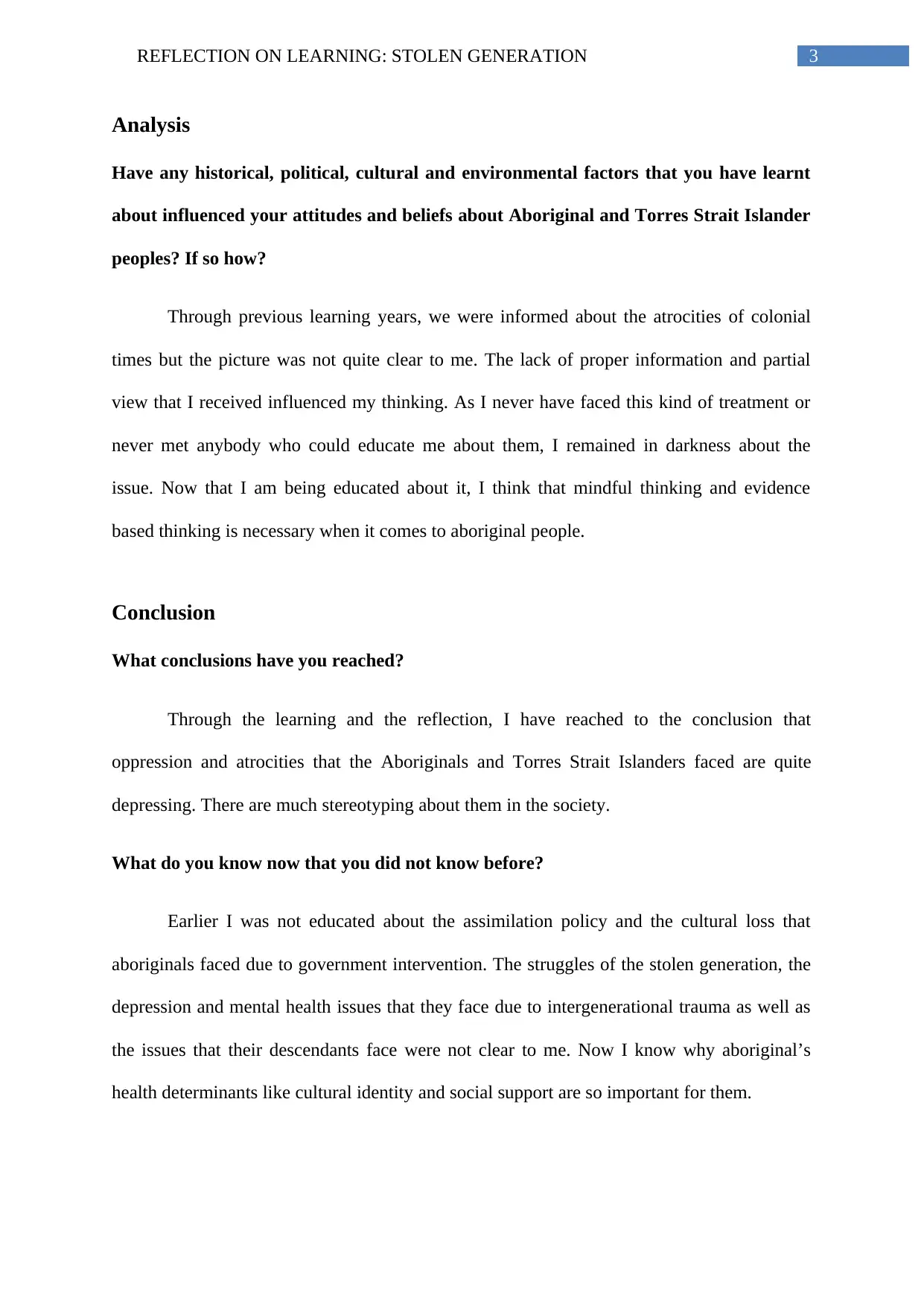
3REFLECTION ON LEARNING: STOLEN GENERATION
Analysis
Have any historical, political, cultural and environmental factors that you have learnt
about influenced your attitudes and beliefs about Aboriginal and Torres Strait Islander
peoples? If so how?
Through previous learning years, we were informed about the atrocities of colonial
times but the picture was not quite clear to me. The lack of proper information and partial
view that I received influenced my thinking. As I never have faced this kind of treatment or
never met anybody who could educate me about them, I remained in darkness about the
issue. Now that I am being educated about it, I think that mindful thinking and evidence
based thinking is necessary when it comes to aboriginal people.
Conclusion
What conclusions have you reached?
Through the learning and the reflection, I have reached to the conclusion that
oppression and atrocities that the Aboriginals and Torres Strait Islanders faced are quite
depressing. There are much stereotyping about them in the society.
What do you know now that you did not know before?
Earlier I was not educated about the assimilation policy and the cultural loss that
aboriginals faced due to government intervention. The struggles of the stolen generation, the
depression and mental health issues that they face due to intergenerational trauma as well as
the issues that their descendants face were not clear to me. Now I know why aboriginal’s
health determinants like cultural identity and social support are so important for them.
Analysis
Have any historical, political, cultural and environmental factors that you have learnt
about influenced your attitudes and beliefs about Aboriginal and Torres Strait Islander
peoples? If so how?
Through previous learning years, we were informed about the atrocities of colonial
times but the picture was not quite clear to me. The lack of proper information and partial
view that I received influenced my thinking. As I never have faced this kind of treatment or
never met anybody who could educate me about them, I remained in darkness about the
issue. Now that I am being educated about it, I think that mindful thinking and evidence
based thinking is necessary when it comes to aboriginal people.
Conclusion
What conclusions have you reached?
Through the learning and the reflection, I have reached to the conclusion that
oppression and atrocities that the Aboriginals and Torres Strait Islanders faced are quite
depressing. There are much stereotyping about them in the society.
What do you know now that you did not know before?
Earlier I was not educated about the assimilation policy and the cultural loss that
aboriginals faced due to government intervention. The struggles of the stolen generation, the
depression and mental health issues that they face due to intergenerational trauma as well as
the issues that their descendants face were not clear to me. Now I know why aboriginal’s
health determinants like cultural identity and social support are so important for them.
Paraphrase This Document
Need a fresh take? Get an instant paraphrase of this document with our AI Paraphraser
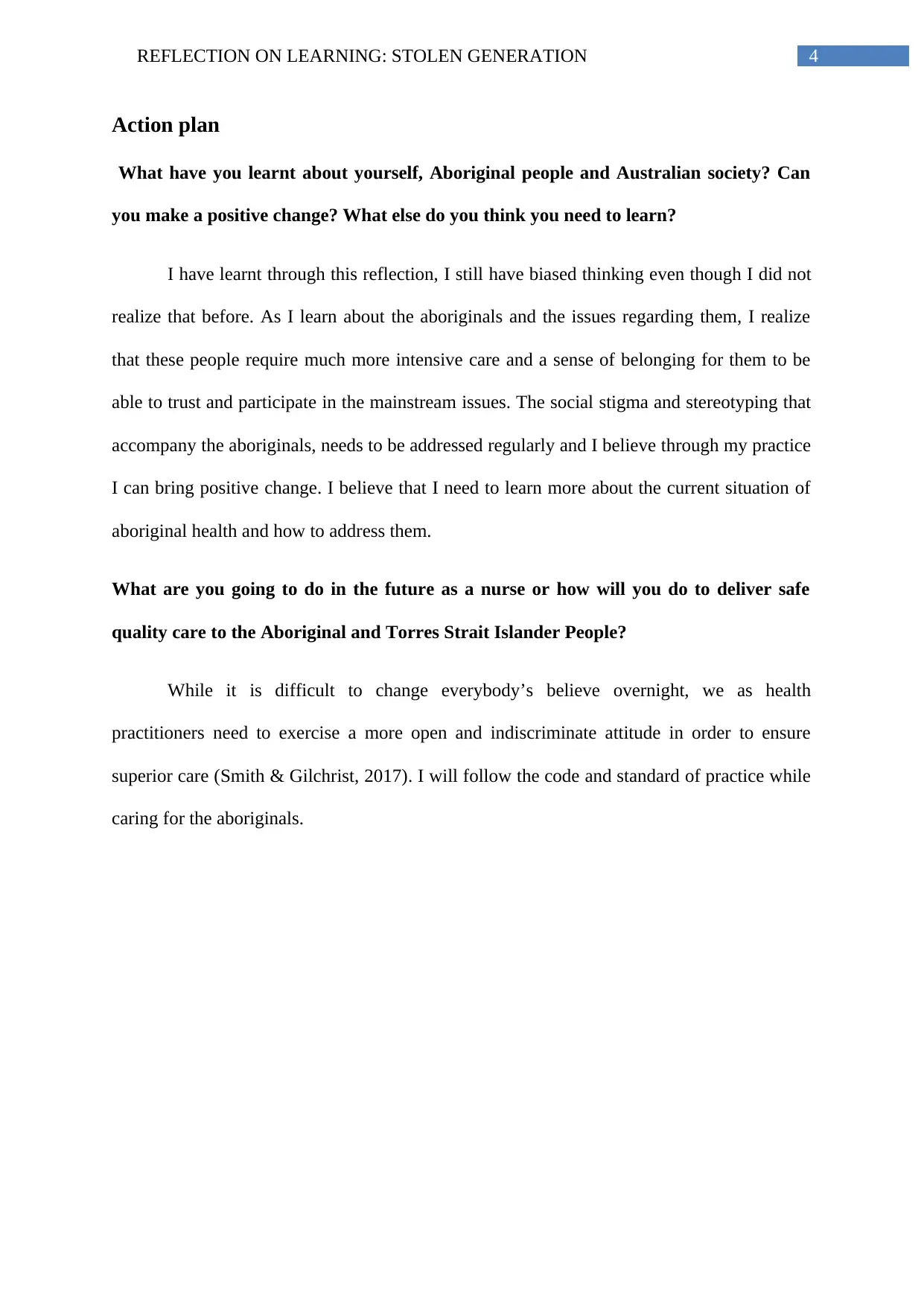
4REFLECTION ON LEARNING: STOLEN GENERATION
Action plan
What have you learnt about yourself, Aboriginal people and Australian society? Can
you make a positive change? What else do you think you need to learn?
I have learnt through this reflection, I still have biased thinking even though I did not
realize that before. As I learn about the aboriginals and the issues regarding them, I realize
that these people require much more intensive care and a sense of belonging for them to be
able to trust and participate in the mainstream issues. The social stigma and stereotyping that
accompany the aboriginals, needs to be addressed regularly and I believe through my practice
I can bring positive change. I believe that I need to learn more about the current situation of
aboriginal health and how to address them.
What are you going to do in the future as a nurse or how will you do to deliver safe
quality care to the Aboriginal and Torres Strait Islander People?
While it is difficult to change everybody’s believe overnight, we as health
practitioners need to exercise a more open and indiscriminate attitude in order to ensure
superior care (Smith & Gilchrist, 2017). I will follow the code and standard of practice while
caring for the aboriginals.
Action plan
What have you learnt about yourself, Aboriginal people and Australian society? Can
you make a positive change? What else do you think you need to learn?
I have learnt through this reflection, I still have biased thinking even though I did not
realize that before. As I learn about the aboriginals and the issues regarding them, I realize
that these people require much more intensive care and a sense of belonging for them to be
able to trust and participate in the mainstream issues. The social stigma and stereotyping that
accompany the aboriginals, needs to be addressed regularly and I believe through my practice
I can bring positive change. I believe that I need to learn more about the current situation of
aboriginal health and how to address them.
What are you going to do in the future as a nurse or how will you do to deliver safe
quality care to the Aboriginal and Torres Strait Islander People?
While it is difficult to change everybody’s believe overnight, we as health
practitioners need to exercise a more open and indiscriminate attitude in order to ensure
superior care (Smith & Gilchrist, 2017). I will follow the code and standard of practice while
caring for the aboriginals.
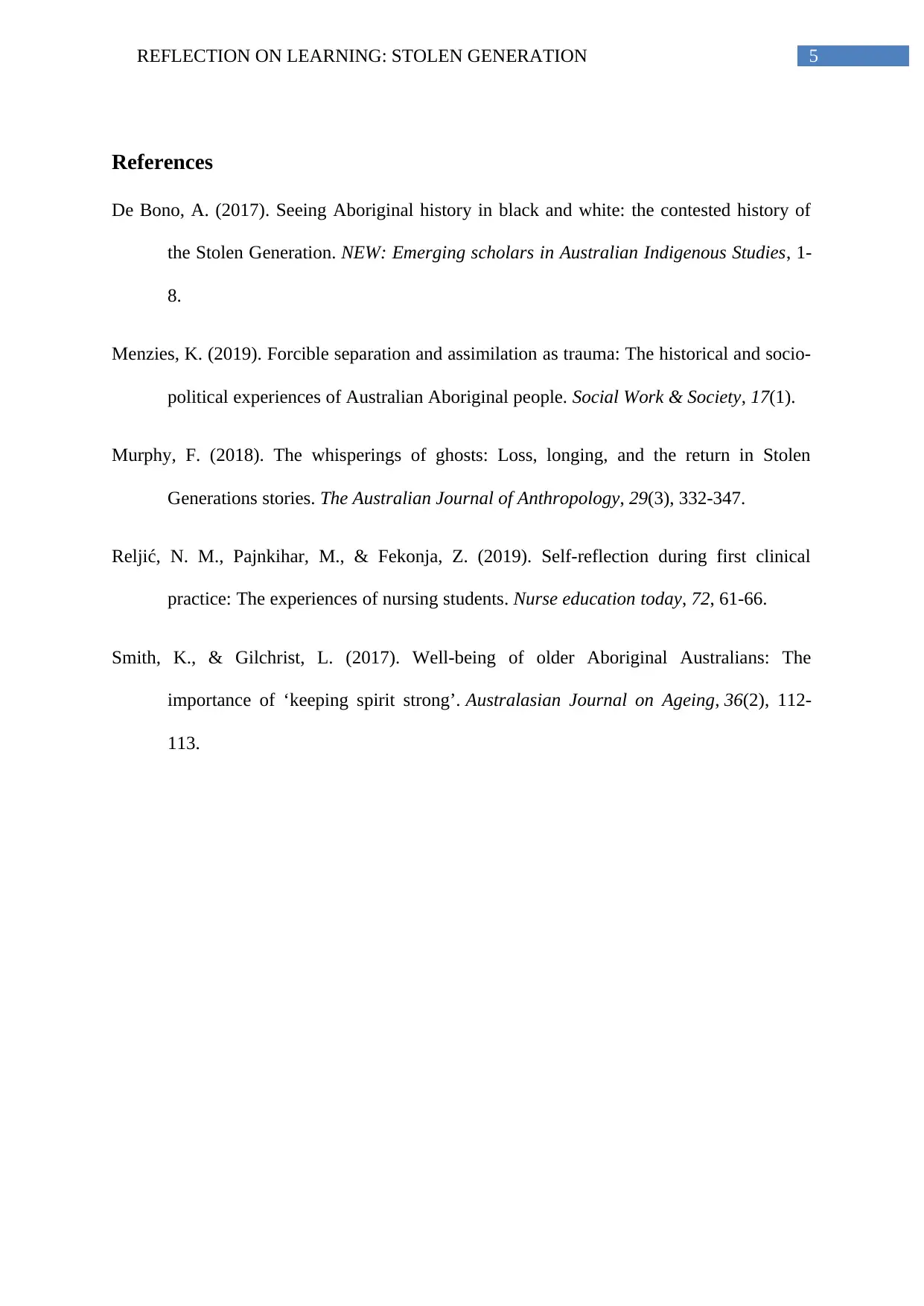
5REFLECTION ON LEARNING: STOLEN GENERATION
References
De Bono, A. (2017). Seeing Aboriginal history in black and white: the contested history of
the Stolen Generation. NEW: Emerging scholars in Australian Indigenous Studies, 1-
8.
Menzies, K. (2019). Forcible separation and assimilation as trauma: The historical and socio-
political experiences of Australian Aboriginal people. Social Work & Society, 17(1).
Murphy, F. (2018). The whisperings of ghosts: Loss, longing, and the return in Stolen
Generations stories. The Australian Journal of Anthropology, 29(3), 332-347.
Reljić, N. M., Pajnkihar, M., & Fekonja, Z. (2019). Self-reflection during first clinical
practice: The experiences of nursing students. Nurse education today, 72, 61-66.
Smith, K., & Gilchrist, L. (2017). Well‐being of older Aboriginal Australians: The
importance of ‘keeping spirit strong’. Australasian Journal on Ageing, 36(2), 112-
113.
References
De Bono, A. (2017). Seeing Aboriginal history in black and white: the contested history of
the Stolen Generation. NEW: Emerging scholars in Australian Indigenous Studies, 1-
8.
Menzies, K. (2019). Forcible separation and assimilation as trauma: The historical and socio-
political experiences of Australian Aboriginal people. Social Work & Society, 17(1).
Murphy, F. (2018). The whisperings of ghosts: Loss, longing, and the return in Stolen
Generations stories. The Australian Journal of Anthropology, 29(3), 332-347.
Reljić, N. M., Pajnkihar, M., & Fekonja, Z. (2019). Self-reflection during first clinical
practice: The experiences of nursing students. Nurse education today, 72, 61-66.
Smith, K., & Gilchrist, L. (2017). Well‐being of older Aboriginal Australians: The
importance of ‘keeping spirit strong’. Australasian Journal on Ageing, 36(2), 112-
113.
⊘ This is a preview!⊘
Do you want full access?
Subscribe today to unlock all pages.

Trusted by 1+ million students worldwide
1 out of 6
Related Documents
Your All-in-One AI-Powered Toolkit for Academic Success.
+13062052269
info@desklib.com
Available 24*7 on WhatsApp / Email
![[object Object]](/_next/static/media/star-bottom.7253800d.svg)
Unlock your academic potential
Copyright © 2020–2026 A2Z Services. All Rights Reserved. Developed and managed by ZUCOL.





